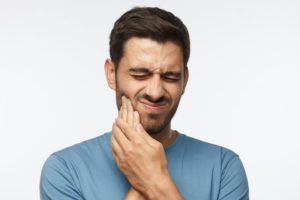Grinding or clenching teeth is an irritating habit that affects about five percent of adults. Many people do not realize they do this as it can occur unconsciously and often manifests as they sleep. Though it may annoy your loved ones, this habit, known as bruxism, can negatively impact the look and feel of your smile if it continues without treatment.
Your dentist can diagnose the reason behind this behavior and develop an appropriate treatment plan. For further encouragement to visit your dentist about this issue, read on to learn about three dental risks that can occur if you do not address chronic bruxism.
Why You Should Not Ignore Teeth Grinding
Wearing Down or Breaking Teeth
When you grate the top teeth against the bottom teeth with a grinding habit, you generate pressure. This high level of pressure can cause the teeth to wear down over time. The outer layer of the tooth, enamel, is durable, but it might erode.
Once deteriorated, the enamel will not regrow. You will need restorative treatment to replace weakened enamel and keep your teeth protected. Similar harm can come to your dental work, like fillings and crowns, that may dislodge or break under this pressure.
The pressure might also cause a dental injury like a crack, chip, or fracture in the tooth. These disrupt the appearance of your smile but will also leave a vulnerable spot that could lead to pain or severe structural concerns in the tooth.
Your dentist can repair this tooth breakage, but ideally, you should preserve as much of your natural smile as possible. Seek preventative treatment by addressing a chronic bruxism habit.
Shifting Teeth Out of Position
Exerting pressure on your teeth through grinding and clenching can harm their structure. But it may also impact their position in the mouth too. Teeth may become crooked due to genetics, but chronic and untreated bruxism may lead the teeth to move and grow misaligned over time.
Crooked teeth can also cause your mouth to not close properly when biting down. Bite problems may worsen your teeth grinding habit too.
You can fix mildly crooked teeth with Invisalign plastic aligners from your dentist. To stop this cycle and protect your smile, talk to your dentist about ways to stop bruxism.
Worsening Jaw Function
The pressure that bruxism exerts on the teeth will also extend down the gums and to the jaw. This can cause the muscles in the jaw to tighten and tense. You might notice soreness and a decline in your ability to move the jaw over time.
These may be early signs of temporomandibular joint disorders or TMJ. If you develop this condition, you will need assistance from your dentist to relieve the symptoms. Other complications stemming from TMJ include earaches, headaches, and a clicking sound when moving the jaw.
You can avoid these issues when you seek treatment for bruxism promptly. Keep your jaw safe by asking your dentist for advice in stopping the clenching and grinding of teeth.

